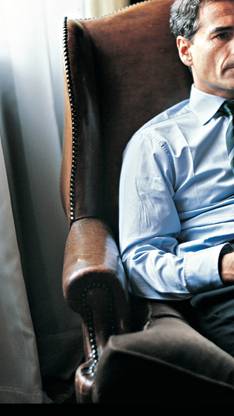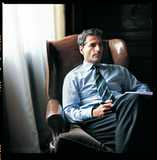Andrés Velasco / Chile
On the Money
Chile is a stable, democratic regime that continues to liberalise its economy. Rich in natural resources, especially copper, its fortunes have traditionally followed a boom and bust cycle according to the market price for the metal. The country’s main trading partners are the US, China and Japan. Chile’s population is 16 million and it has a GDP of $203bn. The country is governed by a centre-left coalition headed by President Michelle Bachelet who came to power in 2005.

Andrés Velasco spent much of his early life in the US, exiled from Augusto Pinochet’s dictatorial regime. Today he is the one with the power as Finance Minister in the government of Michelle Bachelet. Before taking up the post, Velasco, who was born in 1960, was professor at Harvard’s Kennedy School of Government. He is also the author of two bestselling novels. Two weeks ago, Velasco and his wife, Consuelo Saavedra, anchor for Chilean TV’s evening news, invited Monocle to their home, a 1960s modern house furnished with Saarinen furniture, abstract art and a large number of books.
Monocle: You’ve been in government and academia, are the roles complementary?
Andrés Velasco: Problems recur, so it helps to know how they’ve been handled. One way to think about Chile is the following: small country; well-endowed with resources; geographically removed from the largest world markets but with good human skills. In that sense, Chile looks somewhat like the Finland of 30 years ago. How did Finland develop so quickly? It fostered interchange between business, particularly high-tech business, and academia. That would be one way forward.
M: Can a country’s natural resources be a curse?
AV: It’s a problem when your economy is held hostage to their price cycles.
M: How can you deal with this?
AV: It’s vital to take account of the effects of commodity cycles. When this government came in, we gathered a committee of experts and asked them their best estimate for the long-term price of copper. The average opinion was $1.21 (€0.93) a pound, while at the time the price was approaching $3.50 (€2.70) a pound. From that we constructed our budget. In 2006, when prices were high, we ran a budget surplus. Recently, the price of copper has fallen. Traditionally, you would expect that to mean the Chilean economy would be in trouble, but we can look at the future without fear because we have managed to save a good deal of the 2006 windfall. This is a policy that breaks with two centuries of boom and bust.
M: This is your so-called counter-cyclic fiscal policy?
AV: Another way of phrasing it: when your income is high, you save. When your income is low, because the economy is low, because the price of copper is low, you spend more than you would otherwise to move against the cycle. This stabilises economic activity and provides for an economy that grows more smoothly during economic fluctuations.
M: Why have you put the government savings abroad in dollars, rather than pesos?
AV: We save abroad when the price of copper is high because those are times when the peso buys quite a few dollars. We bring those savings back when the price of copper is low, because then the US dollar would buy quite a few pesos. This also stabilises our exchange rate and so safeguards our export potential.
M: Are free markets inherently destabilising to developing countries?
AV: One of the challenges in running an emerging market is to show that you can follow market-based policies, and at the same time foster a predictable economic environment. That is precisely why policies such as budget rules, the counter-cyclical fiscal strategy, and surplus savings abroad are so important.
M: How can you make trade fair?
AV: Chile sees trade as an opportunity, not as a threat. We were, under Pinochet, rather closed to world trade. Today, we are one of the most open economies in the world. When I joined the government in 1990, I wrote a speech in which I predicted that Chilean exports would someday reach $15bn (€11.5bn). I was told to go back and revise that figure because it was incredible. Some 15 years later, exports have reached $60bn (€46bn).
M: There’s no controversy in passing free-trade legislation?
AV: It passes unanimously, because it’s paid off.
M: Is there a dream policy you have wanted to implement?
AV: Many of my generation have a vision of what kind of a country we should build. The most important thing was that democracy be reinstated. Since then, the country has become more prosperous, with more mobility and opportunity than ever. That said, in Chile, who your family is, the neighbourhood in which you grew up, the school you went to, all still matter too much. Chile should be a place where effort is rewarded, and everyone has a fair chance.
M: Why were you away from Chile for so many years?
AV: One Friday… 6 August, 1976… as I was coming out of a football game at school, someone told me my father had been kidnapped. Chile then was a dangerous place. My father was a prominent lawyer and academic, and head of the Social Democratic Party. After the coup, he was very active in the defence of people who’d been arrested. In June 1976, some foreign delegations were convening in Chile and he spoke to them, providing them with evidence of killings and torture. Soon after the foreigners left, my father was arrested, and taken illegally to Argentina. Somehow, he was smuggled into the Venezuelan embassy, left Argentina on a Venezuelan plane, and eventually made his way to Los Angeles. Then the rest of us joined him there.
M: Do you have early memories of Chile?
AV: When I was a little boy, on election day, my father would put me on his shoulders and take me to vote. That was part of life. Election day is always a Sunday, typically in December, early summer here. The country stops and that’s all you talk about. People put on a barbecue, get out their TVs, and while they grill their fish, they watch the election results as if it were a sporting event.
M: Can you tell us more about your father?
AV: He died in 2001 and one of the last things we did together was vote; I pushed his wheelchair to the polling station.
M: You returned to the country for the 1988 plebiscite. Why?
AV: It was a day that could make a difference. And it did; the dictatorship conceded that they had lost the plebiscite, and would have to hold elections and leave power.
M: Odd, the idea of a vote over the future of a dictatorship.
AV: Odder, for non-Chileans, that a dictatorship, when it loses a vote, decides to accept the result. The armed forces recognised that the cost of turning back would be too great. Also, they knew that the opposition was conducting a parallel count. An ingenious sampling method was designed, and election results were reported to an undisclosed location. By 19.00 we had a preliminary count, well before the government.
M: And when the results officially came in?
AV: At midnight, a group of us walked into the city centre. By 03.00 it was joyous; we couldn’t believe that without a shot being fired, simply through the ballot box, the dictatorship had been defeated. That campaign was successful mostly because it had courage and wit and a lot of creativity.
M: What do you mean by creativity?
AV: A group of us came up with some ads whose idea was not to confront the dictators, but rather to soothe people’s fears. One powerful advert showed a demonstrator running away from a policeman. The kid trips, the policeman raises his club, and as he is about to strike him the video freezes, and a circle appears around the fallen demonstrator, then a voice-over says, “This Chilean wants no more violence.” You think that’s the end, but then another circle appears around the policeman, and the voice-over adds: “This Chilean doesn’t want any more violence either.” It made it seem that we were all on the same side. And it worked.
M: What is Pinochet’s legacy?
AV: Pinochet stopped being a factor in Chilean politics long before he died. Observers from abroad tended to overemphasise his shadow.
M: Was it ultimately impossible to have a free economy run by a dictator?
AV: Well under no circumstances was the regime necessary. Economic growth unleashes many forces, some of which make the maintenance of an authoritarian regime difficult, whether it’s of the left or right. Marx himself said that capitalism is a revolutionary force. On that score, unlike on many others, Marx was right.
M: You’re married to a woman powerful in her own right. How do you find that?
AV: When we walk down the street, many more people recognise her than me.
M: How did you and Consuelo meet?
AV: I was a guest on her television show. She asked me about the economy, inflation and so forth…
M: You talked to her about economics… and that worked?
AV: Perhaps not. I didn’t see her for a very long time, except on TV.
M: Are you working on another novel?
AV: A novelist friend of mine just gave me a little notebook. I’ve recently started taking some notes.


